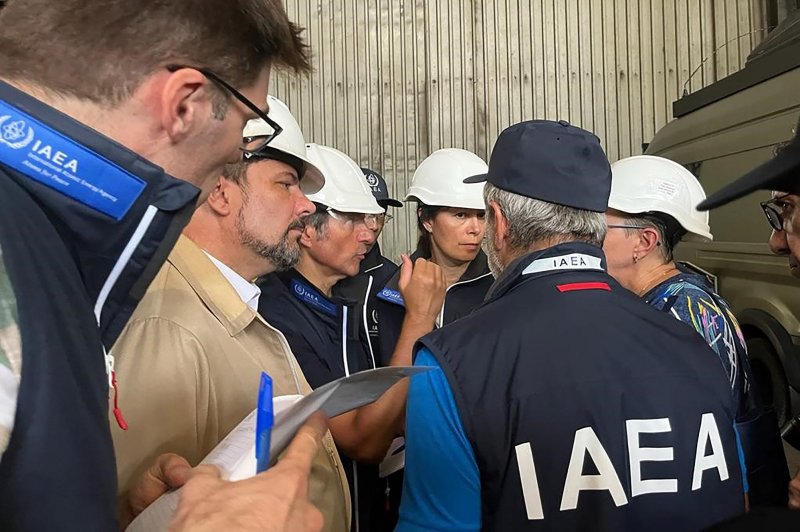Members of the International Atomic Energy Agency inspect the Zaporizhzhia Nuclear Power Plant in Enerhodar, southeastern Ukraine, on Sept. 1 amid fighting between Russian and Ukrainian forces. File Photo by IAEA Press Office/UPI |
License Photo
Sept. 11 (UPI) -- Russian President Vladimir Putin and French President Emmanuel Macron to discuss the conditions around the Zaporizhzhia nuclear power plant as Ukraine disconnected it from the power grid Sunday.
The call between Putin and Macron was announced in a readout from the Kremlin, which placed blame on threats to security of the facility on "regular Ukrainian attacks." Ukraine has said that Russian forces have been staging at the nuclear facility to fire on surrounding communities.
Zaporizhzhia, the largest nuclear power plant in Europe and the first one operated in a war zone, was seized by Russian troops earlier this year. Western officials and the International Atomic Energy Agency fear that continued artillery fire near it poses an imminent nuclear threat to Europe.
"A detailed and frank exchange of views was held on the situation in Ukraine, with a focus on ensuring the safety of the Zaporizhzhia Nuclear Power Plant," according to the Kremlin readout.
"The President of Russia informed about the measures taken by Russian specialists to ensure the physical protection of the station and stressed the need to influence the Kyiv authorities so that the shelling of the station would immediately stop."
The Kremlin added that "mutual readiness was expressed for non-politicized interaction on the situation" with the participation of the International Atomic Energy Association, the United Nations' nuclear watchdog.
Putin also claimed to Macron that Ukrainian troops were using weapons supplied by Western countries to shell Ukraine's own civilian infrastructure in the Donbas region in eastern Ukraine.
Donbas has been largely held by pro-Russian separatists since the Ukrainian territory of Crimea was illegally annexed by Russia in 2014. Putin recognized Luhansk and Donetsk as independent republics before the start of the invasion and is expected to try to annex the region into Russia in coming months.
In a statement from Elysee Palace, Macron said that he asked Putin to withdraw his troops from the Zaporizhzhia nuclear power plant.
Macron said he will remain in contact with Ukrainian President Volodymyr Zelensky as well as the director-general of the IAEA and will speak to Putin again in the coming days "so that an agreement can be reached guaranteeing the safety" of the nuclear facility.
The call came as Energoatom, Ukraine's nuclear regulator, said in a statement Sunday that operations at the nuclear power plant have "completely stopped."
"Power unit No. 6 of the ZNPP was disconnected from the power grid. Preparations are underway for its cooling and transfer to a cold state," Energoatom said.
The nuclear regulator said that the power unit has been operating at a critically low power level for the past three days "since all communication lines of the Zaporizhzhia NPP with the Ukrainian power system were damaged due to Russian shelling."
"Yesterday evening, after one of these communication lines was restored to its operational capacity, it became possible to power the ZNPP's own needs from the energy system of Ukraine. Therefore, a decision was made to shut down power unit No. 6 and transfer it to the safest state - cold shutdown," Energoatom said.
Ukrainian regulators said that the facility will be powered by diesel generators in the event of repeated damage to the lines of communication with the power system.
"Energoatom takes all possible measures to organize the supply of additional batches of diesel fuel to the ZNPP," the statement reads.
Ukrainian officials called for the creation of a demilitarized zone around the power plant to safeguard it from "the racist shelling of the communication lines."
"After that, it will be possible to repair the communication line, to ensure the inclusion and further safe operation of the ZNPP," the statement reads.
The Institute for the Study of War, a think tank based in Washington, D.C., said in an analysis Sunday that Russian forces over the weekend did not attempt a western advance in the Zaporizhzhia province around the power plant and instead focused on shelling to the south.
"Ukrainian sources reported that Ukrainian forces struck unspecified targets in Russian-occupied Polohy on the western Zaporizhzhia Oblast frontline," according to the think tank.
"Russian occupations authorities are setting information conditions to seize control of Zaporizhzhia Nuclear Power Plant operations amid international outcries."
According to the IKnstitute for the Study of War, Vladimir Rogov -- a Russian occupation official in Zaporizhzhia -- claimed that Ukrainian officials "deliberately" shut down power to the facility.
"Rogov stated that he is opposed to peacekeepers visiting the ZNPP, claiming they will be biased against Russia, and claimed the ZNPP needs security against claimed Ukrainian shelling instead of peacekeepers," according to the Institute for the Study of War.
His statements "indicate continued Russian hostility towards any non-Russian intervention," the think tank wrote.
Rogov's statement comes one day after the IAEA released a draft resolution calling on Russia to cease all operations at the power plant.
Last month, Sergiy Kyslytsya, Ukraine's permanent ambassador to the United Nations, told UPI in an interview that an incident at the nuclear power plant "potentially can be much worse than Chernobyl."
He also said that Moscow has tried "sabotaging the visit of Grossi's team" while telling the world that they invited the U.N.'s nuclear watchdog to visit the plant.















